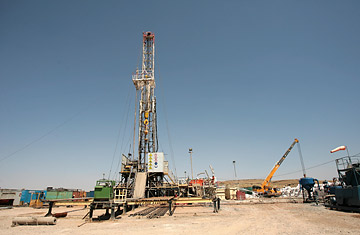
A drilling platform at an oil well digging site near the village of Taq Taq, Iraq.
After five grueling years of war, Iraq's most cherished prize — its mammoth hydrocarbon reserves — might finally be within reach of Western oil companies. Exxon Mobil, Shell, Total and BP appear set to win no-bid contracts allowing them to work in some of Iraq's rich oil fields. The negotiations between Iraqi officials and those companies, first reported in Thursday's New York Times, are for "technical support agreements" for two years and renewable for a third, rather than for lucrative contracts to pump oil out of the ground. Under the envisaged deals, the companies would help Iraqi oil managers overhaul decrepit operations and modernize their equipment in the hope of boosting Iraq's output by about 500,000 barrels a day — an increase of nearly 20% over the best days the Iraqi industry has had since the U.S.-led invasion in March 2003. At the current sky-high oil prices, that could bring in billions more every week for the Iraq government, which sorely needs funds to rebuild the country. And the companies, which had for decades been partners in the Iraq Petroleum Corporation before Saddam Hussein nationalized the industry, would tentatively return to some of the biggest oil fields on the planet. Such arrangements, the corporations hope, will position them to seek long-term access to proven reserves that are second only to Saudi Arabia's.
But plenty of obstacles lie between the Western oil giants and an Iraq bonanza. The contracts are not yet inked, and analysts suspect the deals may be driven more by Iraq's precarious politics rather than by its ability to pump more oil. "It is not too clear to me how they will accomplish an increase in production," says Tariq Shafik, a London-based consultant who helped draft the U.S.-backed oil law that remains stalled in Iraq's parliament. "Production does not happen magically." Shafik believes the government's main motivation for the proposed deals is to attempt to break the two-year deadlock over the new law.
Iraqi politicians have been locked in a bitter dispute over how much control the federal government in Baghdad should have over regional oil operations, and how revenues would be shared among different communities. The technical agreements with the four Western companies would bypass the stalled law, offering oil companies payment for their services rather than a share of the oil. Such production agreements also circumvent the resistance among many Iraqi politicians to selling the rights to Iraqi oil directly to foreign companies, while making use of their technical skills.
"The Ministry of Oil has been accused of being too incompetent to do anything, so they came up with this gimmick," says Shafik. "It is a haphazard, piecemeal approach." But the pressure in Baghdad is intense. Spooked by insurgent attacks and the political infighting, oil companies have stayed out of the country's biggest oil fields near Basra and around Kirkuk. But several smaller companies, including Norway's DNO and the Dallas company Hunt Oil, have cut deals with the Kurdistan Regional Government without bothering to wait for the new federal law to pass. So far, their oil finds in Kurdistan are tiny compared with the known reserves in Kirkuk and Basra. But officials in Baghdad dread that even these could encourage a belief that Kurdistan could survive if it broke away from Iraq. Before 2003, Saddam Hussein had effectively blocked Kurdistan from producing oil, while the rest of the country pumped about 2.5 million barrels a day.
U.S. officials had assumed — and promised as much to Congress — that Saddam's downfall would open the way for oil companies to return to Iraq, overhaul the oil facilities and hugely increase output. Instead, insurgent attacks have bedeviled output and raised security costs by billions of dollars. And a massive smuggling operation has siphoned hundreds of thousands of barrels a day on to the black market. Another reason for seeking foreign help is the soaring production costs that affect Iraq as much as they affect the wider world oil industry. Shortly after the war began, Shafik estimated that the capital outlay required for Iraq to pump an extra 500,000 barrels a day would be between $15 billion and $20 billion. But, he says, that figure could be about 70% higher now. "[Iraq's oil fields] were not maintained, they were lacking spare parts," says Leila Benali, an analyst on Middle East oil for the Cambridge Energy Research Associates. "They used patchy solutions over decades." The new deals may be just one more patchy solution, while the country's future political and security arrangements remain unsettled.
